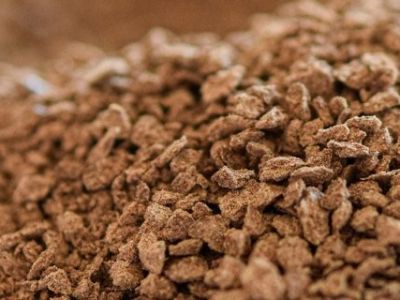SUPPORTING ANIMAL HEALTH BY WOOD-BASED FEED
Physiological effects of wood-based feed supplements on livestock

Close-up of a woodbased feed ingredient produced by agromed Austria GmbH
Picture: Agromed

Monolayer of Caco-2-cells (40x magnification)
Picture: FH Wels

Two Wistar rats in a typical experimental cage
Picture: Christiane Schwarz
The planned collaboration aims to develop a profound basis of an innovative feeding concept for piglets that counteracts the performance losses due to the omission of therapeutic zinc oxide administration. The project elaborates on the use of sustainable additives and active substances of fresh wood and thus will contribute to the global goal of antibiotic reduction and stabilisation of the health status of young animals. Those wood-based animal feed products used in this project are rich in lignocellulose, lignans and/or phenolic acids, all of which are bioactive phytochemicals. Lignocellulose is an insoluble dietary fibre consisting of interlinked sugar molecules that cannot be digested by endogenous animal enzymes. However, these fibres can at least partly be used as an energy source for gut bacteria thus influencing the animal's gut flora. The fermentation of fibres by bacteria releases short-chain fatty acids that can have a positive impact on the animal's physiology including immuno-modulatory and anti-inflammatory effects. Lignans are low molecular weight polyphenols in plants that are also metabolized by gut bacteria before absorption by the intestine. They are thought to possess anti-microbial, anti-inflammatory and antioxidant potential. The third group of bioactive phytochemicals in the here investigated products are phenolic acids. They are known for their antioxidant, anti-inflammatory and anti-microbial effects after being metabolized by the residing intestinal microbiota.
The goal of this project is to test the cyto-protective potential of the aforementioned wood-based animal feed products. The ability to maintain the intestinal barrier under stressful conditions and the influence on inflammatory signalling will be tested in cell culture. Further, anti-inflammatory and antioxidant potential will be evaluated in feeding studies with chickens and rats. With these experiments we will elucidate potential health supporting effects of the suggested wood-based feed products.
Lead Researcher:

Mag. Dr. Christiane Schwarz
Deputy Head of Institute
Institute of Animal Nutrition, Livestock Products, and Nutrition Physiology (TTE),
University of Natural Resources and Life Sciences, Vienna
+43 1 47654-97615
www.boku.ac.at


